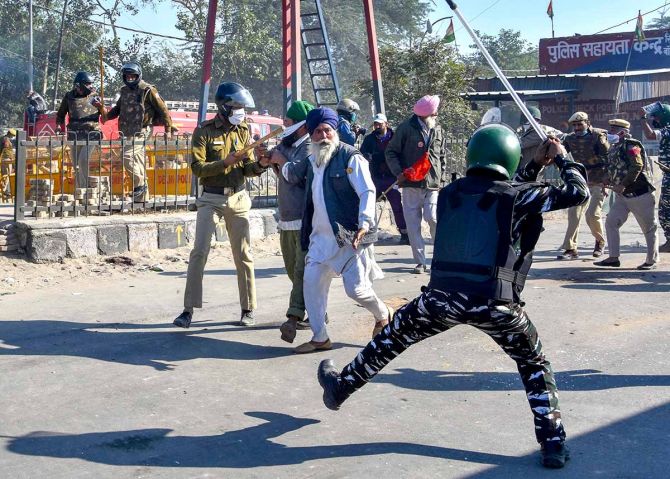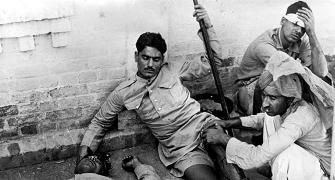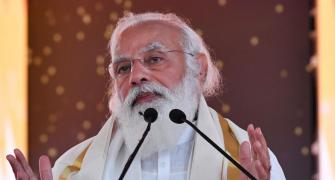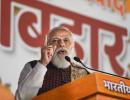'India's defining characteristic has been its ability to manage and sustain democratic governance through an accommodation of ethnic, linguistic, and religious diversity.'

"India is a thriving democracy when it comes to elections and the peaceful transition of power, but a diminishing democracy when it comes to other institutions and freedoms," notes the distinguished political scientist Zoya Hasan, Professor Emerita, Centre for Political Studies, Jawaharlal Nehru University whose forthcoming book is titled Ideology and Organization in Indian Politics: Growing Polarization and the Decline of the Congress Party (2009-2019).
As India celebrates Independence Day, Dr Hasan spoke about the weaknesses and strengths of Indian democracy in an e-mail interview with Rediff.com's Archana Masih.
Democratic institutions have been chipped away, sometimes slowly and surreptitiously, at other times blatantly and quickly.
What are the institutions/pillars of our Constitutional democracy that have seen maximum damage?
The ruling dispensation has not only established a stranglehold on public institutions, but also holds sway over many private entities.
Most problematic is the way public institutions are being press ganged in the service of the ruling party to consolidate authoritarian and ideological control over institutions to pave the way for a Hindu rashtra. The credibility of institutions has been compromised.
This erosion is true of the formal institutions of democracy as well as statutory ones, the Right to Information, for example, has been greatly weakened.
The higher judiciary and the Election Commission are two striking examples of failure of institutions to function independently of the executive. The role of the judiciary is extremely important since citizens rely on it for justice when pitted against the excesses of State-power.
The judiciary had generally been independent of the executive during much of the post-Independence period, but has not been so lately although there are perceptible signs of independence of the apex court under the present chief justice.
Of course, the judiciary cannot single-handedly prevent communal authoritarianism from riding roughshod over rights and liberties of citizens, but the fact remains that the judiciary in America played an important role in preventing Donald Trump's usurpation of power.
It's fair to ask why the long period of democracy in India didn't create institutions that are more resilient and durable than those that we have.
When, according to you, did the downslide of Indian democracy begin? Can such damages ever be reversed?
The democratic downslide began with the Emergency but that lasted two years whereas what we are witnessing now is a continuous erosion of democracy and corrosion of institutions for the past seven years. The downslide today is different in at least one important respect.
The Emergency was targeted against political opponents but not against any social or ethnic group whereas now hate and polarisation is targeted against one community and is deployed as an instrument for winning elections.
With the economy tanking, this regime relies on polarisation and Hindu nationalism to consolidate the Hindu vote -- a strategy which works in certain parts of the country. Whether this can be reversed will depend upon the political struggles against communalism and struggles for the right to equality.
The solution lies squarely within politics and in changing the structures of politics.

What are the greatest threats facing the Constitution as it comes closer to the 75th year landmark? Do you share a sense of gloom that many Indians feel?
The greatest contemporary challenge to the Constitution comes from majoritarian nationalism that seeks to reconfigure the Indian nation as one that belongs exclusively to the Hindu majority. This idea demonstrates an utter disdain for the egalitarian philosophy of the Indian Constitution.
Freedom of speech is in danger. The recent arrests and filing of criminal cases against several public intellectuals, activists, journalists, and also other creative persons including cartoonists and comediennes comes against an increasingly restrictive environment for dissent and opposition in India.
The regime is reluctant to allow protests and opposition to stand against it. All State agencies available to the government have been utilised to silence dissent. This has exposed and widened the fault lines in our polity. But I don't share a sense of gloom about the future of India's democracy even though democracy requires a level playing field which currently we don't have.
My optimism stems from the growing civil society resistance, political opposition to the regime and the difficulties it has faced in winning state elections despite humongous financial and other resources at its disposal.
Evidently, India's incredible diversity and regional assertions have created major hurdles in the path of Hindutva.
What are our country's greatest strengths, the unique attributes of the Indian people that will prevent the fabric of society from rupturing despite the majoritarianism?
Our greatest strength is India's Constitution and its democracy.
India's defining characteristic has been its ability to manage and sustain democratic governance through an accommodation of ethnic, linguistic, and religious diversity.
We are, moreover, talking about a democracy that has lived and worked for more than seven decades. Indians value the long democratic experience and the diversity, argumentation and the plurality of opinions that are a part of this experience. That's India's distinctiveness. It will survive the present attempts to stifle it.
Feature Presentation: Aslam Hunani/Rediff.com









